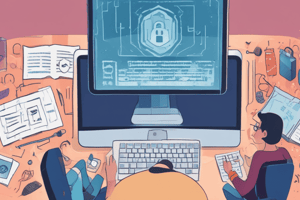Podcast
Questions and Answers
It is recommended to use the same password across multiple sites to avoid forgetting them.
It is recommended to use the same password across multiple sites to avoid forgetting them.
False (B)
Private browsing modes can completely eliminate online tracking.
Private browsing modes can completely eliminate online tracking.
False (B)
A strong password should be at least 8 characters long and include only uppercase letters and numbers.
A strong password should be at least 8 characters long and include only uppercase letters and numbers.
False (B)
It's safe to respond to suspicious emails or calls that ask for personal information, as long as you verify the authenticity of the sender.
It's safe to respond to suspicious emails or calls that ask for personal information, as long as you verify the authenticity of the sender.
Using a VPN can completely eliminate the risk of online privacy breaches.
Using a VPN can completely eliminate the risk of online privacy breaches.
Flashcards are hidden until you start studying
Study Notes
Password Security
- Use strong and unique passwords for each online account
- A strong password:
- Is at least 12 characters long
- Includes a mix of uppercase and lowercase letters, numbers, and special characters
- Is not easily guessable (e.g., avoids birthdays, names, common words)
- Password management:
- Use a password manager to generate and store unique, complex passwords
- Avoid using the same password across multiple sites
- Consider using a passphrase (a sequence of words) for added security
- Password best practices:
- Avoid sharing passwords with anyone
- Don't write down passwords or store them in an insecure location
- Change passwords regularly (e.g., every 60-90 days)
Online Privacy
- Be cautious when sharing personal information online:
- Only provide necessary information when creating an account or making a purchase
- Be wary of websites or apps that ask for excessive personal information
- Understand privacy settings:
- Familiarize yourself with the privacy settings of social media platforms, browsers, and apps
- Adjust settings to limit the amount of personal information shared
- Use private browsing modes and VPNs:
- Private browsing modes can help protect your online activity from being tracked
- Virtual Private Networks (VPNs) can encrypt your internet connection and mask your IP address
Avoiding Phishing
- Identify phishing attempts:
- Be wary of suspicious emails, messages, or calls that ask for personal information
- Watch for red flags such as:
- Urgent or threatening language
- Misspellings or grammatical errors
- Unknown or generic sender addresses
- Requests for sensitive information
- Verify authenticity:
- Check the sender's email address or website URL to ensure it's legitimate
- Look for the "https" prefix and a lock icon in the address bar to ensure a secure connection
- Avoid taking the bait:
- Don't respond to suspicious messages or calls
- Don't click on links or download attachments from unknown sources
- Keep your operating system, browser, and antivirus software up to date
Password Security
- Use strong and unique passwords for each online account to prevent unauthorized access
- A strong password must be:
- At least 12 characters long for added complexity
- A mix of uppercase and lowercase letters, numbers, and special characters for unpredictability
- Not easily guessable, avoiding birthdays, names, common words, and other identifiable information
- Password management is crucial:
- Use a password manager to generate and store unique, complex passwords
- Avoid password repetition across multiple sites to minimize the attack surface
- Consider using a passphrase, a sequence of words, for added security and memorability
- Follow best practices for password safety:
- Refrain from sharing passwords with anyone, even friends and family
- Don't write down passwords or store them in an insecure location
- Change passwords regularly, ideally every 60-90 days, to maintain security
Online Privacy
- Exercise caution when sharing personal information online:
- Only provide necessary information when creating an account or making a purchase
- Be wary of websites or apps that request excessive personal information
- Understand and adjust privacy settings:
- Familiarize yourself with social media platforms', browsers', and apps' privacy settings
- Customize settings to limit the amount of personal information shared with third parties
- Use private browsing modes and VPNs to protect your online activity:
- Private browsing modes help shield your online activity from being tracked
- Virtual Private Networks (VPNs) encrypt your internet connection and mask your IP address
Avoiding Phishing
- Identify phishing attempts by watching for red flags:
- Be cautious of suspicious emails, messages, or calls that request personal information
- Look out for:
- Urgent or threatening language
- Misspellings or grammatical errors
- Unknown or generic sender addresses
- Requests for sensitive information
- Verify authenticity to avoid falling prey:
- Check the sender's email address or website URL to ensure legitimacy
- Look for the "https" prefix and a lock icon in the address bar to ensure a secure connection
- Avoid taking the bait:
- Don't respond to suspicious messages or calls
- Don't click on links or download attachments from unknown sources
- Keep your operating system, browser, and antivirus software up to date to prevent vulnerabilities
Studying That Suits You
Use AI to generate personalized quizzes and flashcards to suit your learning preferences.




